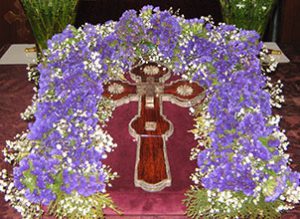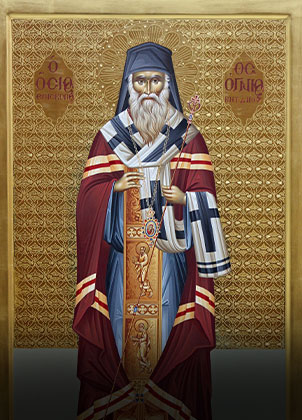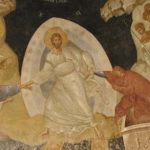Во имя Отца и Сына и Св. Духа.
В день престольного праздника нашего храма Владимирской иконы Божией Матери, также совершается память св. мучеников Адриана и Наталии.
Св. Мученик Адриан и его жена Наталия жили в начале 4 века, в Никомидии, столице императора Максимиана, гонителя христиан. Они были молоды и богаты. Адриан был язычник, а Наталья унаследовала от своих родителей веру во Христа, которую она хранила в тайне.
Однажды была схвачена группа христиан, скрывавшихся в пещере близ Никомидии. Их мучили, принуждали поклониться идолам, но они все терпели с мужеством. Адриан, видя как христиане переносят страдания за веру, был поражен их терпением. Он спросил их: «Какой награды ожидаете вы от своего Бога за мучения?» Мученики отвечали: «Такой награды, какой мы не можем описать, а ум твой не может постигнуть». Желание получить вечную награду охватило душу Адриана, и он объявил себя христианином, желая умереть за Христа со святыми мучениками.
Св. Наталия услышала, что Адриан взят в темницу и стала плакать, думая, что его арестовали за какую-то провинность. Но когда она узнала, что он исповедал себя христианином, она обрадовалась и благодарила за него Бога. Ее не страшило потерять своего любимого мужа и остаться вдовой. Единственно чего она боялась, что он не выдержит мучений и отречётся от Христа. Она укрепляла его в его решимости стать мучеником, умоляла его не жалеть ни о чем земном, ни о красоте, ни о молодости, ни о богатстве. Святого Адриана и других мучеников подвергли жестоким пыткам. Мучитель приказал отбить им руки и ноги на наковальне. Святая Наталия, опасаясь, чтобы муж, видя страдания других, не поколебался, просила мучителей начать казнь с него, и сама помогала класть его руки и ноги на наковальню.
Для человека плотского такое поведение непонятно и может показаться жестоким. Но любовь Наталии к своему мужу была не плотская любовь; вера в будущую жизнь побеждала ее естественное сострадание и жалость. «Вера же есть осуществление ожидаемого и уверенность в невидимом», по слову св. Ап. Павла (Евр. 11:1).
Для св. мучеников невидимый духовный мир, будущая вечная жизнь, были более реальными, чем земная жизнь, в которой все непостоянно и скоро оканчивается. Вера в будущую жизнь одушевляла их, давала направление их мыслям, стремлениям и поступкам.
Нам страшно даже читать о мучениях, которые выносили св. мученики. Как же мы можем подражать им? Св. мученики были такими же людьми, как и мы, они так же имели свои человеческие слабости. Но их вера во Христа преодолевала эти слабости, и делала их сильными.
Мы будем подражателями их, если наши жизненные решения будут определяться не мирскими расчётами, не соображениями выгоды, а нашей верой в будущую жизнь и надеждой получить в наследие Царство Небесное.
Мы нередко стоим перед испытанием нашей веры в будущую жизнь. Бывают такие ситуации, когда мы имеем возможность приобрести какую-либо мирскую выгоду, например: получить повышение по службе, избежать неприятности, освободиться от ответственности, и т. п., но для этого нужно в чем-то поступить вопреки совести и заповеди Божией.
Такие случаи показывают, действительно ли вера живет в нашей душе. Что для нас важнее: заповеди Божии или любовь к нашим детям, родственникам, друзьям, мирские выгоды и богатство? Если в душе нет мысли о будущей жизни, то в такой душе не может жить вера во Христа.
Господь призывает Своих последователей: «Не собирайте себе сокровищ на земле, где моль и ржа истребляют и где воры подкапывают и крадут, но собирайте себе сокровища на небе, где ни моль, ни ржа не истребляют и где воры не подкапывают и не крадут, ибо где сокровище ваше, там будет и сердце ваше» (Матф. 6:19-21)
Да поможет нам Господь укреплять в себе веру в будущую жизнь и передать ее нашим детям. Мы только тогда сможем передать ее, когда наши дети увидят нашу веру не только в наших словах, но и в наших поступках.
Аминь.
In the name of the Father, and of the Son, and of the Holy Spirit.
On the day of the Vladimir Icon of the Mother of God, our parish feast, the memory of the Holy Martyrs Adrian and Natalia is also celebrated.
Holy Martyr Adrian and his wife Natalia lived at the beginning of the 4th century in Nicomedia, the capital of the emperor Maximian, who was a persecutor of Christians. Adrian and Natalia were young and prosperous. Adrian was from a pagan family, while Natalia inherited from her parents the faith in Christ, which she kept secret.
Once, a group of Christians, who were hiding in a cave near Nicomedia, was captured. The executioners tortured them in order to force them to worship idols, but they courageously endured torments. Adrian, seeing how Christians endured suffering for their faith, was amazed at their patience. He asked them: “What reward do you expect from your God for your sufferings?” The martyrs answered: “Such a reward as we cannot describe, and your mind cannot comprehend.” The soul of Adrian was seized with the desire to receive the eternal reward, and he declared himself a Christian, wishing to die for Christ with the holy martyrs.
St Natalia heard that Adrian had been taken to prison and began to weep, thinking that he had been arrested for some fault. But when she found out that he confessed himself a Christian, she rejoiced and thanked God for him. She was not afraid to lose her beloved husband and become a widow. The only thing she feared was that Adrian would not endure the torment and deny Christ. She supported him in his resolve, imploring him not to regret anything earthly, neither beauty, nor youth, nor wealth. Saint Adrian and the other martyrs were subjected to cruel tortures. The torturer ordered their hands and feet to be beaten off on an anvil. St Natalia, fearing that her husband, seeing the sufferings of others, would not waver, asked the torturers to begin the execution with him, and she herself helped to put his hands and legs on the anvil.
To a worldly person, such behaviour is incomprehensible, and may seem cruel. But Natalia’s love for her husband was not carnal love. In her heart, faith in the future life surpassed natural compassion and pity. “Now faith is the assurance of things hoped for, and the confidence of things not seen,” in the words of St. Paul. (Heb. 11:1).
For the holy martyrs, the invisible spiritual world, the future eternal life, were more real than earthly life, in which everything is temporary and soon ends. Faith in the future life encouraged them, gave direction to their thoughts, hopes and actions.
How can we imitate the holy martyrs, when even reading about their tortures is scary for us? The martyrs were human beings like us, they also had their human weaknesses. But their faith in Christ overcame these weaknesses, and made them strong.
We will be their imitators if our life decisions are determined not by worldly calculations, not by considerations of gain, but by our faith in the future life and the hope of receiving the Kingdom of Heaven as an inheritance.
Our faith in the future life is often tested. There are times when we have the opportunity to obtain some worldly benefit, for example, to get a promotion, avoid trouble, be exempt from responsibility, etc., but for this end we need to act contrary to our conscience and God’s commandments.
Such cases show whether faith really lives in our hearts. What is more important for us: God’s commandments or love for our children, relatives, friends, worldly benefits and wealth? If there is no thought of the future life in the soul, then faith in Christ cannot live in such a soul.
The Lord calls on His followers: “Do not lay up for yourselves treasures on earth, where moth and rust destroy, and where thieves break in and steal, but lay up for yourselves treasures in heaven, where neither moth nor rust destroys, and where thieves do not break in and steal, for where your treasure is, there will your heart be also” (Matthew 6:19-21)
May the Lord help us to strengthen our faith in the future eternal life and pass it on to our children. We will be able to pass it on only when our children see our faith not only in words, but also in our actions.
Amen.









